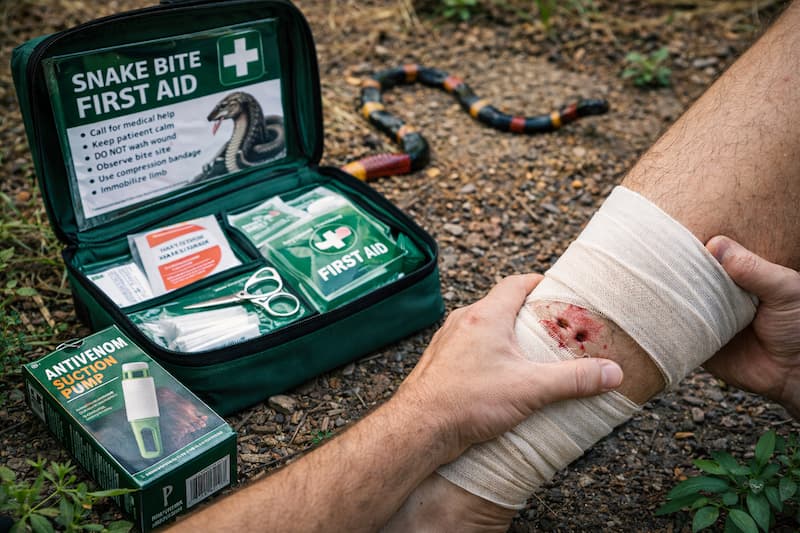Snakebite first aid is a critical skill in Australia, especially if you live, work, or play outdoors. In Brisbane North, most snake encounters end without incident, but when a bite does occur, the response in the first few minutes can make a real difference. The key goals are simple: keep the person still, apply pressure immobilisation correctly, and get urgent medical help.

What To Do In Case Of Snakebite
This guide focuses on practical, evidence‑based steps. If you want to understand why certain bites are dangerous and others are not, start with Most Common Venomous Snakes in Australia.
Step 1: Get to Safety and Stay Calm
Move away from the snake. Do not attempt to catch or kill it. Most secondary bites happen when people try to handle the snake. If it’s safe to do so, note what the snake looked like, but never risk another bite to identify it. Staying calm slows the spread of venom and reduces panic in everyone around you.
Step 2: Call Emergency Services Immediately
Treat every snakebite as a medical emergency. Call emergency services right away and follow their instructions. Do not wait for symptoms to appear. Some bites can take time to show obvious signs, but delays are risky.
If the snake is still nearby and poses a risk to others, contact a licensed professional once emergency services are on the way. Local support details are available on the Snake Catcher Brisbane North page.
Step 3: Apply Pressure Immobilisation
In Australia, the recommended first aid for suspected venomous snakebite is pressure immobilisation. This helps slow the movement of venom through the lymphatic system.
How to apply it:
- Keep the bitten person still. If possible, lie them down.
- Apply a broad pressure bandage directly over the bite site.
- Wrap the bandage firmly up the limb (toward the body) and down again, covering as much of the limb as possible. The bandage should be firm but not cut off circulation.
- Immobilise the limb using a splint or makeshift support.
- Do not remove the bandage until medical staff are ready to treat the bite.
If you don’t have a proper bandage, use cloth or clothing that can be wrapped firmly. The objective is to limit movement, not to stop blood flow.
Step 4: Keep the Person Still and Reassured
After the bandage and splint are in place, keep the person as still as possible. Movement can accelerate venom spread. Monitor breathing and responsiveness while waiting for help.
What Not To Do In Case Of Snakebite
Many common myths about snakebite treatment are dangerous. Avoid the following:
- Do not cut the bite.
- Do not suck out venom.
- Do not apply a tourniquet.
- Do not wash the bite area if it might remove venom traces medical staff can use for identification.
- Do not use ice or electricity.
- Do not give alcohol or caffeine.
If you want more detail on why these methods are harmful, the overview in Snake Antivenom explains how modern treatment works and why proper first aid matters.
Symptoms to Watch For (But Don’t Wait For)
Symptoms can vary by species and individual. They may include:
- Severe local pain or swelling
- Headache, nausea, or vomiting
- Dizziness or collapse
- Breathing difficulty or weakness
Again: do not wait for symptoms. Call for help immediately.
Preparing for Snake Season
If you live in a snake‑active area, keep a pressure bandage in your home, car, or hiking kit. Know the basic steps before you need them. Training your family on what to do can prevent panic in the moment.
If you’re unsure how to reduce encounters at home, Snake Proof Your Home offers practical prevention steps.
When to Call a Snake Catcher
A snake catcher is not a substitute for emergency medical care after a bite. Always prioritise medical help. But if there’s an ongoing risk to others, a licensed catcher can safely remove the snake. For urgent assistance, Emergency Snake Removal explains how response works.
TLDR
Snakebite first aid in Australia is clear: call emergency services, apply pressure immobilisation, keep the person still, and do not use tourniquets, cuts, or suction. Treat every bite as an emergency—even if symptoms aren’t obvious. Preparedness and calm action save lives.